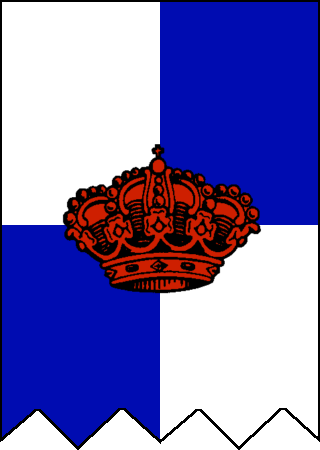Venedor, the Vainan - 139th King of Kings
Of the Darrow Dynasty [Sigil: A Silver Arrow, Firing upward into the Moon, on a Midnight Blue Field]
Venedor was under suspicion long before he put on his crown. Having married a foreign princess due to his father’s alliance with Vaina, the commonwealth was ill-disposed toward him. He made more enemies when he tried to reduce the Kings of Monos back to lordship, under the remarkable suggestion that their current system was “confusing.” Venedor’s Queen, Harriette, was well-loved despite her “foreignness,” and many suggested she was a wise hand guiding their foolish king. Venedor became envious of Harriette’s popularity early, and much of her life was spent placating these concerns. She tried to reinstate the Zaljan concept of the Six, but most of the Monosi kings objected: depending on their origins, these lords would necessarily undermine the regions that had no representatives within the council. Her further suggestion of creating “the Ten” gained some traction, but the kings soon realized that this would mean men (and possibly even women) from their regions having influence superior to themselves. At a loss, Harriette assembled the ten kings of Monos together at the Gilded Table: a great table at Vargano featuring ten blunted spikes. The Ten Kings would meet to counsel the King of Kings once a year, where they would hang their crowns upon the spikes and act as Lords Counselor to Venedor and his heirs. This table featured an elaborate throne for Venedor (so there was no mistaking who was in charge) and two smaller thrones for theKing of Kings' selected advisers. Venedor selected his Queen (unsurprisingly) and (at her suggestion) his younger brother Olleron, who had no particular loyalties to any province. The mortal kings’ attempts to sway Venedor could be very successful, if only they could get him away from his two advisers. Olleron was forceful and obstinate if not especially wise, yet he knew to trust Harriette’s judgment any time he felt out of his depth. Unfortunately, Venedor’s envy at his wife’s popularity and facility at governance, continued to sicken their relationship, and in 864 RA he replaced her with his firstborn son (also named Venedor). His brother Olleron had clearly learned from Harriette, however, and continued rebuffing the mortal kings’ attempts at manipulation, until he too was replaced in 866 RA with King Harmen of Gemosia's brother Ulret. The two still managed to counsel Venedor when they could, dissuading him from being so easily led by Gemosia, but the king’s relationships with both suffered greatly. Rumors abounded that Olleron and Harriette were lovers, though Venedor never acted on these rumors. However, he did seize an opportunity to separate the two in 869 RA, when the Far East Orckid Empire occupied Embelmadro and killed its king. Venedor sent Olleron to the front, where he died in 870 RA, sending the King of Kings into a horrible spiral of remorse and depression. He abandoned all pretense of ruling, and refused his queen’s multiple attempts to repair the breach in their marriage. His son Prince Venedor was replaced by King Harmen of Gemosia's firstborn son Ullimere, leaving the nation in the hands of Gemosia. This led to open revolt by four of the other regions. Harriette, seeing her husband rendered impotent by grief, took up the defenses herself. She faced resistance from all corners, even those loyal to the High Crown, especially when she sent word to her sister, the Princess Liminara of Vaina, to send military support. Many saw this as a Vainan invasion, and Harriette was forced to lead her own troops to the Vainan army and combine them, making it impossible to fight on multiple fronts. She was slain by a chance arrow in battle in 875 RA. When King Venedor learned of this, he leapt into the Vargano Bay. His body was discovered by a fisherman named Rafid the next day. Sometimes called Venedor the Vain. Harriette was at times called Harriette the Handler (the Meddler by her harsher critics), and by her defenders: the Queen of Kings.

Children

